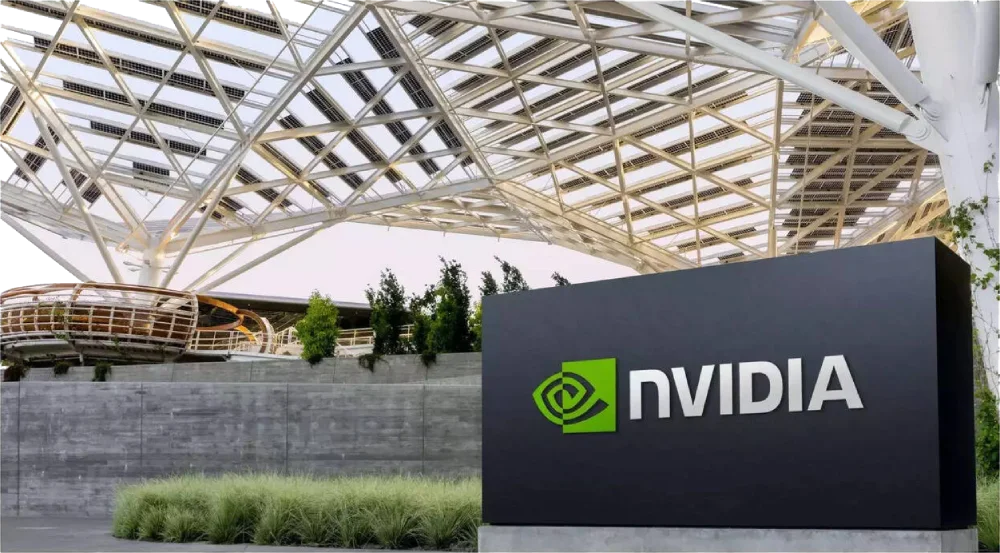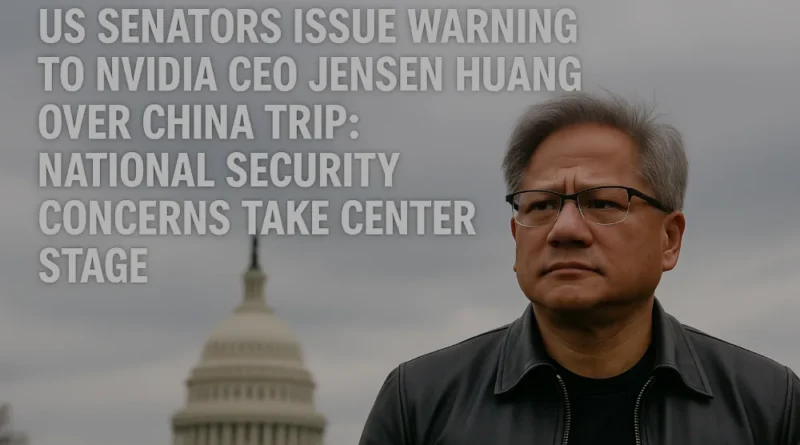US Senators Issue Warning to Nvidia CEO Jensen Huang Over China Trip: National Security Concerns Take Center Stage
In a significant development that underscores the escalating tensions between the United States and China over technology and national security, a bipartisan pair of U.S. senators has sent a pointed letter to Nvidia CEO Jensen Huang. The letter, dispatched on July 11, 2025, addresses Huang’s planned trip to China and raises alarms about potential meetings with Chinese companies suspected of undermining U.S. chip export controls. This move highlights the delicate balance global tech giants must navigate amid geopolitical rivalries and the critical role of advanced semiconductors in national security.
The Context: U.S.-China Tech Tensions
The U.S. has been tightening restrictions on the export of advanced semiconductor technologies to China, driven by concerns that such technologies could bolster Chinese military and intelligence capabilities. Nvidia, a global leader in artificial intelligence (AI) and graphics processing units (GPUs), has been at the forefront of this technological race. Its chips are pivotal in powering AI systems, supercomputing, and other cutting-edge applications, making the company a focal point in U.S. efforts to safeguard its technological edge.
The senators’ letter comes at a time when U.S.-China relations are strained, particularly in the tech sector. Recent posts on X reflect public sentiment, with users noting the senators’ concerns about Nvidia’s potential engagements with Chinese firms linked to military or intelligence bodies. These posts, while not conclusive evidence, indicate the issue’s resonance in public discourse, amplifying the scrutiny on Nvidia’s actions.
The Warning: What the Senators Said
The bipartisan pair signed a letter that urges Huang to avoid any meeting with Chinese companies who may have breached the U.S. export controls. The senators also indicated that these interactions might end up benefiting organizations dealing with military or intelligence of China at the expense of the national security benefits of the U.S. The reports indicate that the senators advised the Nvidia to be more cautious about the situations due to the strategic value of its technology in the development of AI in the world.
This caution is not just a recommendation but a slight of the wider U.S policy of limiting the export of the sensitive technologies to its opponents. The fact that the senators are targeting the corporations that are allegedly damaging U.S. control on chip exports indicates that their efforts are still under focus as they come out to investigate Chinese companies that might be by-passing the restrictions in order to gain access to the advanced chips.
Why This Matters: Nvidia’s Role in the Global Tech Landscape
The control of Nvidia in the semiconductor and AI verticals means that it is a keystone in the technology landscape of the world. Its GPUs play an important role in such applications as self-driving cars, and large AI models that have commercial and military applications. The government of the USA is afraid that Nvidia technology gets into the hands of the Chinese who have links to the military department, and this might allow them to develop faster AI-powered warfare, spy tactics, or computer tools faster.
The senatorial letter is also representative of a growing concern of increased scrutiny on how the American tech companies conduct business overseas. This is because the U.S. will keep imposing export control and sanctions increasing the pressure on companies such as Nvidia to shape its business strategies to support national security.

Unique Insights: The Indian Perspective
This is a special development to the readers in India. India is fast becoming an international technology hub, and there is increased focus on the development of the domestic AI and semiconductor industry. The Indian government has also initiated programs such as India Semiconductor Mission to strengthen its domestic chip fabrication to lessen its dependence on external producers such as Nvidia. The rivalry between the U.S. and China in technology might also indirectly affect the Indian technology ecosystem because a ban on the sale of chips can puncture the global supply chain that Indian companies and startups seem to be using to advance the growth of AI with the aid of GPUs provided by Nvidia.
Additionally, the fact that India engages in a strategic partnership with the U.S. through such frameworks as the Quad (including the U.S., India, Japan, and Australia) puts it in a very special place. As the U.S. tries to defend against the Chinese technological intent, India might want to do more cooperation with them in AI and semiconductor innovation. Nonetheless, the issue with the Indian technology companies is that they have to struggle through the convoluted world of global supply chains, in which the U.S. export controls may simply become a bottleneck.
Data from Credible Sources
As stated in a Reuters report, the United States Department of Commerce has been applying huge efforts on enforcing the export control of advanced semiconductors since 2022 with the target of Chinese companies that might have a potential military association. In 2024 alone, the U.S has blacklisted more than 100 Chinese entities in its exports list, a positive indicator that America is entering a strong battle against technology transfer. Although Nvidia has products that abide by these regulations, there are issues on how to make sure that its chipsets are not sold to restricted entities, out of their arms.
The Times of India has also pointed out that it was specifically in relation to the apprehensions regarding the use of Nvidia chips by Chinese companies to develop AI applications with the military applications in mind that the senators were talking about in their letter. This matches with a report by Center of Strategic and International Studies or CSIS in 2023 that indicated that AI based systems will provide additional surveillance and defense powers to China were they to be powered by a sophisticated chip such as the Nvidia ones.
Implications for Nvidia and the Tech Industry
To Nvidia, the caution provided by the senators is an indicator that the company must be keen on conducting due diligence in its foreign operations. China, especially, has already piled on pressure on the company, having blocked its access to sell high-end chips such as the A100 and H100 under U.S. export controls. Nvidia has hit back with export compliant Chinese-aimed chips like the H20, designed to cater to the Chinese, but this too has attracted criticism on the grounds that they might be circumventing the intent of U.S. export embargo.
The additional tech industry is suffering the repercussions as well. Others who are too affected by the pressure include competitors such as AMD and Intel, cloud providers using Nvidia ecosystem, and AI startups. The letter by the senators is an indication that the U.S. policymakers are taking a more direct attention on the global activities of tech companies and this may even redefine the operation of these firms in geopolitically sensitive nations.
Engaging the Reader: What’s at Stake?
For tech enthusiasts, policymakers, and business leaders, this story is a reminder of the intricate interplay between technology, geopolitics, and national security. Imagine a world where the chips powering your favorite AI applications could also fuel military advancements in a rival nation. The stakes are high, and Nvidia’s next steps could set a precedent for how tech giants balance profit motives with ethical and security considerations.
For Indian readers, the question is equally compelling: How can India leverage its growing tech prowess to navigate this global chessboard? As the U.S. and China vie for technological supremacy, India’s role as a neutral yet strategic player could shape the future of AI and semiconductor innovation.
Conclusion: A Call for Vigilance
The senators’ letter to Jensen Huang is more than a cautionary note—it’s a clarion call for vigilance in an era where technology is a battleground for global influence. Nvidia, as a leader in AI and semiconductors, must tread carefully to maintain its reputation and comply with U.S. regulations. For the global tech community, this episode underscores the need for ethical decision-making and robust compliance frameworks in an increasingly fragmented world.
As the situation unfolds, stakeholders in India and beyond will be watching closely. Will Nvidia adjust its China strategy, and how will this impact the global AI landscape? Only time will tell, but one thing is clear: the intersection of technology and geopolitics is a space where every move counts.
Disclaimer
The information presented in this blog is derived from publicly available sources for general use, including any cited references. While we strive to mention credible sources whenever possible, Web Techneeq – Web Development Company in Mumbai does not guarantee the accuracy of the information provided in any way. This article is intended solely for general informational purposes. It should be understood that it does not constitute legal advice and does not aim to serve as such. If any individual(s) make decisions based on the information in this article without verifying the facts, we explicitly reject any liability that may arise as a result. We recommend that readers seek separate guidance regarding any specific information provided here.

